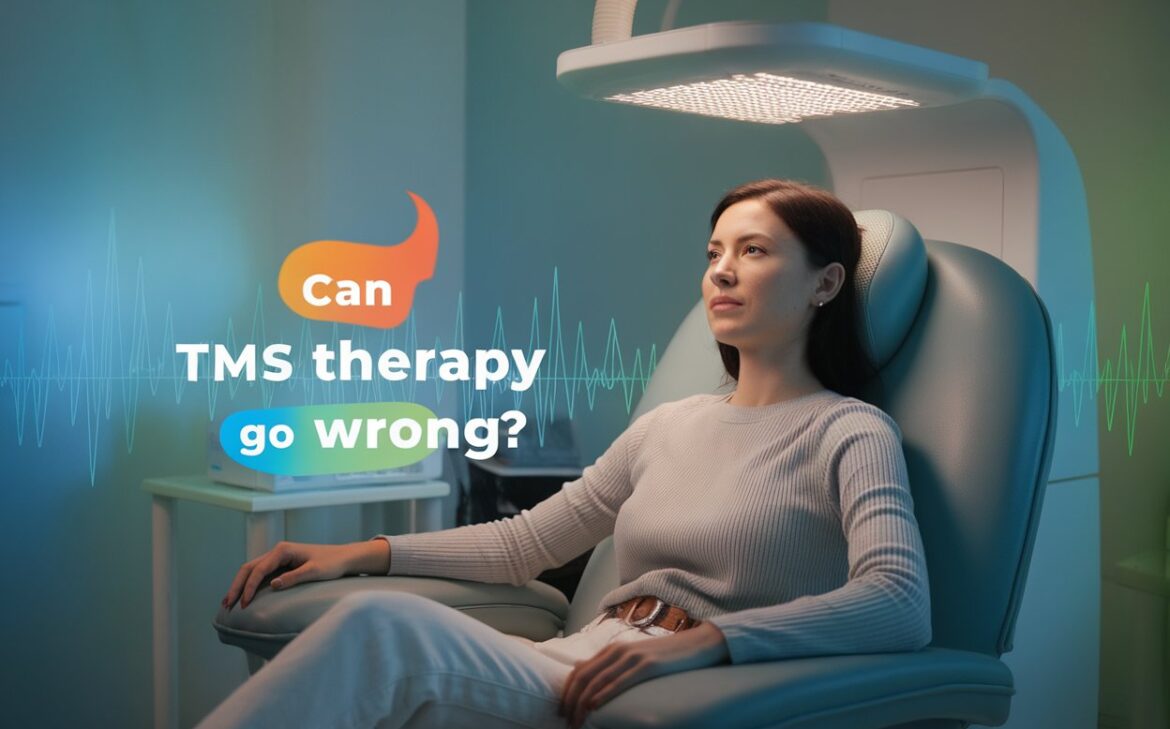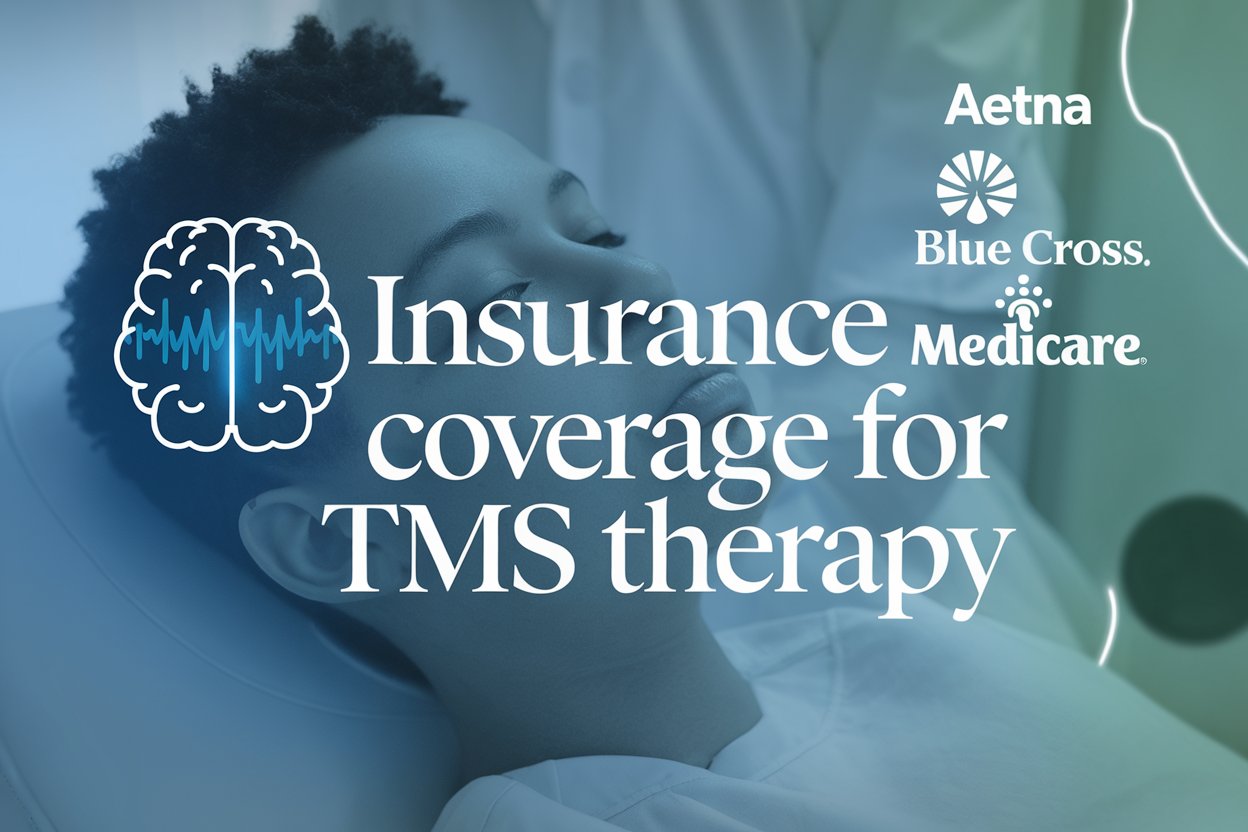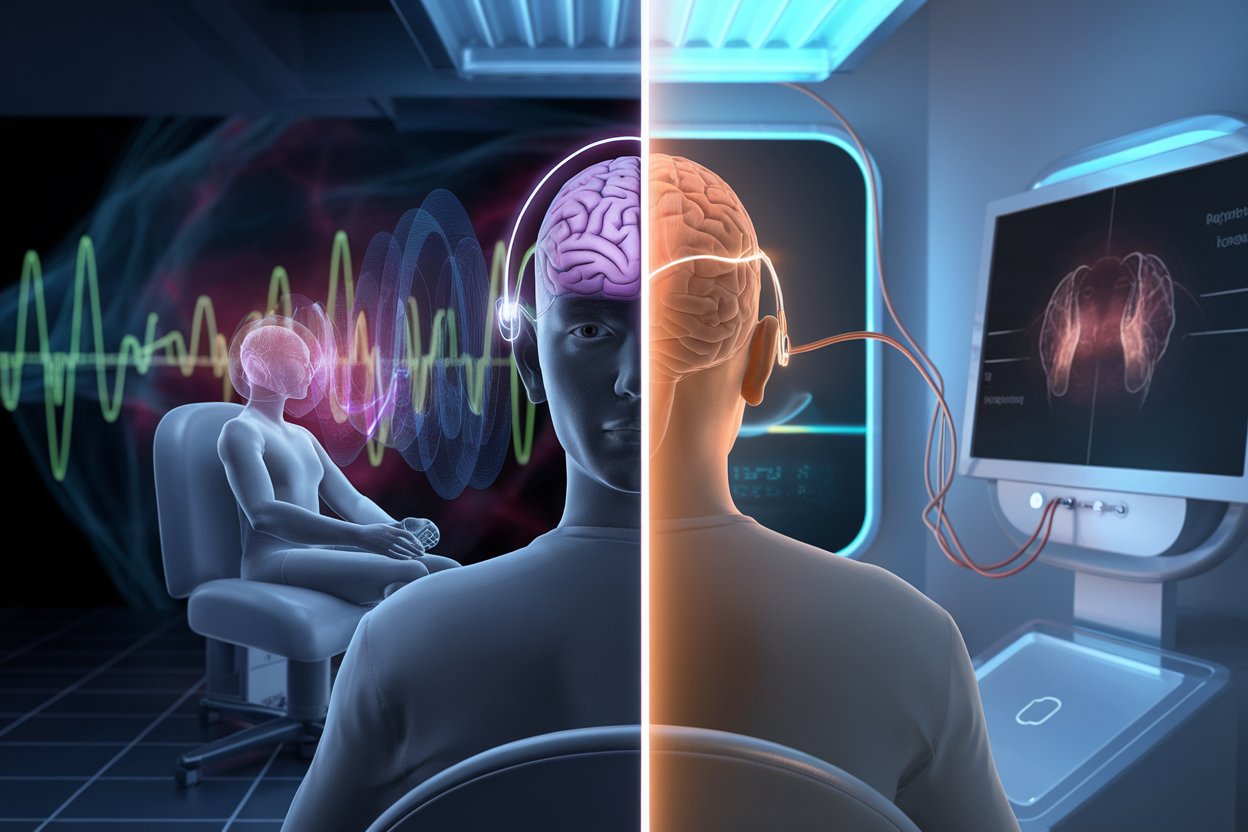Transcranial Magnetic Stimulation (TMS) therapy has helped many people deal with depression, especially when other treatments haven’t worked. You might be asking, “Can TMS Therapy Go Wrong?” TMS is mostly safe, but it’s good to be aware of the risks.
This blog discusses the possible drawbacks of TMS therapy, highlighting that these risks are rare and can be controlled. By understanding what is true and what is not, you’ll get a better idea of how safe and effective TMS therapy is, helping you decide if this new treatment is right for you.
Understanding TMS Therapy
TMS therapy is a treatment that doesn’t involve surgery and uses magnetic pulses to activate certain parts of the brain. It’s used to help people with depression, particularly when medications and talk therapy haven’t worked. A TMS session is short, usually taking 30 to 60 minutes, and the patient can go back to their normal activities right after.
TMS is a safe choice for many people, but like any medical treatment, it’s normal to wonder, “Can TMS Therapy Go Wrong?” Let’s explore what might happen and why these risks are uncommon and can be handled easily.
Can TMS Therapy Go Wrong?
TMS therapy works well for many people, but it can have some side effects. Most of these are mild and will go away quickly. The question “Can TMS therapy go wrong?” is about knowing the possible problems so you can make a smart choice.
Common Side Effects of TMS Therapy
The most common side effects of TMS therapy include:
- Mild Headaches: Some patients experience mild headaches after their sessions. These headaches are usually short-lived and can be treated with over-the-counter pain relief.
- Scalp Discomfort: During the treatment, patients might feel a tapping or tingling sensation on their scalp. This is due to the magnetic pulses but tends to fade after a few sessions.
- Lightheadedness: Some people feel a little lightheaded after their first few treatments, but this generally subsides quickly.
These side effects are usually not serious enough to stop treatment. Most people notice these feelings fade as they keep going with their sessions, and they can go back to their usual activities right after.
Rare Risks of TMS Therapy
People are frequently worried about more significant risks when they enquire, “Can TMS therapy go wrong?” Fortunately, severe side effects are extremely uncommon.
- Seizures: There is a small chance that TMS therapy will result in a seizure. This risk, however, is very minimal and comparable to that of using antidepressant drugs. Clinics carefully assess patients to make sure TMS is safe for them, which further reduces this risk.
- Mood Changes: Rare reports of people experiencing mood swings, like elevated anxiety or irritability, have been made. Once more, this is uncommon, and medical professionals keep a careful eye on patients to handle any changes of this nature.
Managing Potential Issues
Effective communication is essential for handling the uncommon side effects of TMS treatment. Any unusual experiences you have during or after treatment should always be reported to your healthcare provider. You can make changes to improve the comfort of your sessions. The majority of clinics have skilled technicians on staff who can change the settings to help relieve any pain.
Here are some tips to help manage potential issues:
- Communicate Symptoms: Always talk to your provider if you have a headache or discomfort. They can adjust the settings to improve your experience.
- Take Breaks if Needed: If you feel tired or lightheaded, rest for a few minutes before resuming your daily activities.
Why TMS Therapy is Generally Safe
Despite the alarming nature of the question, “Can TMS therapy go wrong?” TMS was created with patient safety in mind. The controlled and targeted magnetic pulses are only able to influence the precise brain regions that are involved in mood regulation. Since TMS is noninvasive, no surgery, anaesthesia, or recuperation period are required.
Prior to beginning TMS treatment, patients are evaluated in depth. They are better candidates for the treatment as a result. People who have metal implants in their heads, a history of seizures, or specific neurological disorders might not be good candidates for TMS, but these precautions help prevent any issues.
How Likely Are Issues with TMS Therapy?
Serious problems from TMS are very uncommon. A lot of people wonder if TMS therapy can have problems because they’ve come across stories online. It’s important to remember that bad experiences are not usual. Most patients say they feel better, with improved mood, less anxiety, and overall better well-being.
Clinical studies show that TMS works for about 60% to 70% of people with depression that doesn’t respond to other treatments. The most common side effects are mild and short-term, especially when compared to the possible benefits for people dealing with severe depression.
Why TMS is a Great Option for Many Patients
TMS therapy has many benefits, especially when you compare it to traditional treatments like medication. For people who have tried many antidepressants without improvement, TMS offers a new option. It focuses on parts of the brain related to mood, helping to increase activity in these areas.
Patients appreciate that TMS therapy has:
- No Systemic Side Effects: Unlike medications, TMS does not cause weight gain, sexual dysfunction, or nausea.
- Quick Recovery Time: Patients can return to their normal activities immediately after a session.
- Non-Invasiveness: There’s no surgery, no needles, and no need for anaesthesia.
Can TMS Therapy Go Wrong? Understanding the Myths
Some common misunderstandings can make people cautious about TMS. Some people are concerned that TMS might cause lasting harm or change their personality a lot. Clinical evidence shows that TMS is safe and does not harm the brain in the long run.
- Brain Damage Concerns: TMS is noninvasive and does not involve any kind of direct contact with brain tissue. The magnetic pulses stimulate nerve cells without causing harm. There is no evidence to suggest that TMS can cause brain damage.
- Personality Changes: TMS therapy targets specific areas of the brain that are linked to mood regulation. It does not alter your personality; it simply helps improve mood-related symptoms.
What Should You Do if You Are Concerned About TMS Therapy?
If you’re unsure about whether TMS therapy can be risky, it’s best to speak with your healthcare provider. They can give you clear information about the process and talk about any worries you might have. Knowing the facts can help you relax and make a good decision.
Keep in mind that all treatments can have side effects, but the benefits of TMS therapy usually outweigh the risks, especially for those who haven’t found relief with regular treatments.
Summary: Can TMS Therapy Go Wrong?
Can TMS therapy have problems? There are some risks, but they are usually small and short-lived. Serious problems are uncommon, and most patients believe that the benefits are much greater than any possible issues. TMS therapy has helped many people with depression improve their lives and has fewer side effects than other treatments.
If you’re thinking about TMS therapy, speak with a doctor to find out if it’s suitable for you. With the right checks and guidance from professionals, TMS is a safe and effective treatment that gives hope to many individuals.
Take Control of Your Mental Health Today
Concerned about the risks of TMS therapy? While rare, they are manageable. If you’re ready to explore how TMS can help treat depression or other conditions, contact American TMS Clinics. Our team will guide you through the process, ensuring a safe and effective experience for you.





